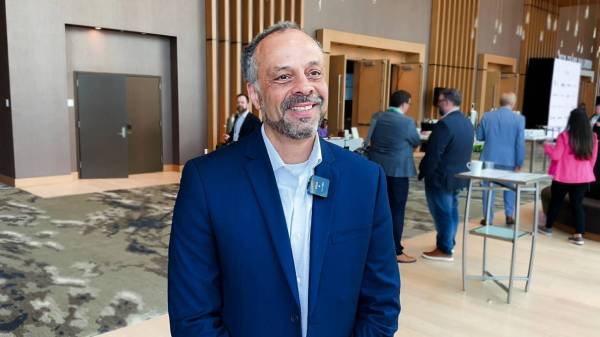Minnesota’s expanded anti-fraud efforts include AI pilot project

Minnesota Gov. Tim Walz on Friday announced several new efforts to reduce fraud against the state’s assistance programs, including an upcoming experimental project that will use artificial intelligence.
The changes are driven by an executive order Walz signed Friday that consolidates the criminal anti-fraud divisions in the state’s Department of Commerce and Bureau of Criminal Apprehension. Walz said at a press conference that the new Fraud and Financial Crimes Unit will allow investigators to share resources and catch more perpetrators of a digital crime that’s become increasingly common since the COVID-19 pandemic.
Throughout the press conference, Walz took a serious tone, initiating his remarks by referencing an FBI statistic showing that financial crimes against government aid programs rose 21% since 2022.
“These are not just financial crimes against the state and against the taxpayers of Minnesota,” Walz said. “These are crimes against children. These crimes have basically targeted programs that either feed children or help children in need like we’ve seen recently with autism services.”
The FBI last month served search warrants at two autism treatment centers, in Minneapolis and St. Cloud, as part of a larger Medicaid fraud investigation, the Minnesota Reformer reported. A warrant application claimed that employees of one center were “18 or 19-year old relatives of the owners who had no formal education beyond high school and no training or certification related to the treatment of autism.” The warrant showed that one of the centers billed Medicaid more than $850,000 for autism services for a single client, and that it received $438,000.
The Reformer reported last June that the number of providers in Minnesota treating autism increased from 41 in 2018 to 328 last year, while the amount paid to providers rose from $6 million to nearly $192 million, according to the Minnesota Department of Human Services.
Walz also announced Friday the state attorney general office’s Medicaid fraud unit will gain nine additional staff members and that state agencies will be given additional latitude to stop payments and report their findings when they suspect fraud. Walz said he’s also seeking increased criminal penalties.
“I’m going to ask that we increase the penalties on these financial fraud crimes against public assistance,” he said. “They are so damaging. They undermine people’s faith in government, they undermine the very programs that improve people’s lives.”
Tarek Tomes, Minnesota’s chief information officer and commissioner of Minnesota IT Services, the state’s technology bureau, said a proposed AI “pilot program” will help his office “spot potential payment problems before a complaint or claim is submitted.”
“As payment integrity approaches have gone from retrospective years ago, to prospective in the near past here, to now with the tools that are available to preemptive, we must leverage these new AI capabilities to protect services and crucial funds,” Tomes said. “State programs have long worked to address suspicious activity, and now we’re taking it further by enhancing our tools and adopting a more advanced approach to proactively strengthen the services we provide.”
Tomes said the AI project will use the same practices used in the private sector to detect and flag “unusual payment activity.”
“We will look to use machine learning and generative AI to gain deep data insights that will help us identify potential risk factors and spot early signs of fraudulent behavior,” Tomes said. “This pilot marks a crucial first step in building this capacity across executive branch programs.”
State government assistance programs have long been targets of fraud, but the incidence of fraud skyrocketed during the COVID-19 pandemic, when numerous emergency aid programs from the federal government attracted opportunistic criminals. According to the United States Sentencing Commission, two thirds of those who’ve been caught defrauding such programs had little or no prior criminal history.
The Government Accountability Office reported in 2023 that fraud against the federal Unemployment Insurance program alone during the COVID-19 pandemic totaled between $100 billion and $135 billion, but other estimates place the overall total much higher. Utah Chief Information Officer Alan Fuller said at a technology conference in 2023 that by his rough estimate, state governments distributed as much as $560 billion in fraudulent payments.
Corrected Jan. 9, 2025: This story was updated to reflect the GAO’s most recent statistics on pandemic fraud.






